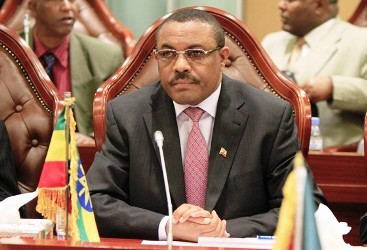 Ethiopia, a country from which some 85 percent of the Nile River is sourced, may have aggravated water resource tensions with Sudan and Egypt, two downstream Nile River countries. On May 28, Ethiopia began diverting water from the Blue Nile River so that construction could continue on the Grand Ethiopian Renaissance Dam, a 6, 000-megawatt hydroelectric plant.
Ethiopia, a country from which some 85 percent of the Nile River is sourced, may have aggravated water resource tensions with Sudan and Egypt, two downstream Nile River countries. On May 28, Ethiopia began diverting water from the Blue Nile River so that construction could continue on the Grand Ethiopian Renaissance Dam, a 6, 000-megawatt hydroelectric plant.
The Grand Renaissance project necessarily will stem the flow of water to downstream countries. While Ethiopia insists that the dam will benefit downstream countries, the fact remains that the Nile has little water to spare. Sudan is thus concerned about the project -- as is Egypt, which would be particularly hard-hit by the disrupted water flow.
Ethiopia's decision to divert the Blue Nile River followed a meeting between Egyptian President Mohammed Morsi and Ethiopian Prime Minister Hailemariam Desalegn on the sidelines of the May 27 African Union summit. During the meeting, Morsi publicly downplayed Egypt's concerns about the dam's construction, while Egypt's ambassador to Ethiopia insisted that his country ultimately would benefit from the project. Perhaps most alarming to Egypt was not the announcement itself, but rather how quickly Ethiopia announced the diversion after the meeting.
In 1959, Sudan and Egypt signed an agreement enacting water usage quotas for the Nile's water. Under the agreement, Egypt has a quota of 55.5 billion cubic meters per year and Sudan has a quota of 18.5 billion cubic meters per year. While the Nile River is the world's longest, its annual discharge -- about 85 billion cubic meters -- is relatively low. For comparison, the Mississippi River has an annual discharge of 500 billion cubic meters.
A Supply Problem
The downstream countries' concern pertains to supply and demand: There may not be enough water to go around. Egypt currently consumes its entire quota of water, and by 2050 it is expected to need an additional 21 billion cubic meters to support its growing population. Although Sudan does not consume the entire amount of water allocated to it, evaporation and flow rates mean there is little water to spare.
This could be problematic, considering the Grand Renaissance project necessarily will divert water. Ethiopia will have to channel into a reservoir water that would otherwise be flowing downstream. How much water downstream countries will be deprived of -- and how long they will be deprived of it -- will be determined by how fast Ethiopia can fill the reservoir.
While Addis Ababa has not disclosed exactly how much water it will divert, Egypt has claimed that the dam will divert 18 billion cubic meters of water. If Ethiopia decides to use it for irrigation -- Addis Ababa currently claims it will use the diverted water for electricity generation only -- the project could divert even more. Moreover, some estimates suggest that climate change could lower the Nile River's discharge by as much as 25 percent. Whether or not these estimates are accurate, water supply and demand clearly are coming under increased pressure.
A substantial disruption in Nile River discharge would be particularly harmful to Egypt, which could have difficulty sustaining itself without adequate water supplies. The country uses roughly 47 billion cubic meters of water for irrigation and agriculture. Less water for crops means less food for consumption, and the country's financial woes -- which include becoming a net importer of staple commodities likes oil -- have left Cairo struggling to afford higher volumes of food, particularly wheat.
A history of tensions between Egypt and Ethiopia make a diplomatic solution unlikely. While the probability is low for outright military action between the two, Cairo could coordinate with Khartoum to pressure Addis Ababa to change its plans.
In any case, water resources issues will persist in a region that is mostly desert. The 1959 water-sharing agreement for the Nile River, like that of the Colorado River, has become problematic and could probably benefit from some revisions. Egypt will be in tough position if the dam restricts its water supply, but it is unlikely that Cairo will be able to influence Addis Ababa one way or the other.
Courtesy : Stratfor (www.stratfor.com)